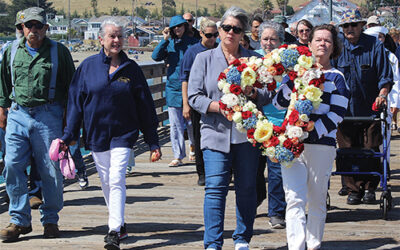Maggie Smith, a former Morro Bay resident who is recovering from COVID-19 in Italy, holds up a sign saying “it’s all going to be okay” in Italian.
By Maggie Smith, Rimini, Italy
Maggie Smith, the daughter of a Morro Bay resident lives in Italy and had COVID-19. These are her words:
Hello USA: A personal story and plea from a U.S. citizen living in Italy. It’s a bit of a read, please take the time. You should have it since you’re supposed to be at home…
“You need to consider yourself positive.” That’s the sentence the kind, young paramedic kept repeating to me as he prepared to leave my apartment after a 20-minute wellness check at my home here in Rimini, Italy.
After three days of chest and lung pain, body ache, dry cough, chills, digestive upset and shortness of breathe, I knew he was right.
For the past week I’d been feeling pretty tired — exhausted really — mentally foggy and a little depressed. I thought it was just that my school had closed, my hiking club had cancelled all it’s upcoming treks, my city, and then all of Italy, had gone into quarantine.
Plus I’d lost my income for the foreseeable future.
I mean, that’s enough to exhaust anyone. But then one evening, a week into the lockdown, the lung pain and shortness of breath started and got steadily worse. I knew what it was right away but felt sure I’d be OK.
I’m young enough, healthy enough, however, after describing my symptoms to my sister, a nurse practitioner, she urged me to call the coronavirus hotline here in Italy.
For everyone in the U.S. watching the news out of Italy and shaking their heads saying, “Oh that’s socialized health care for you,” you should know that Italy has a highly advanced and modern health care delivery system.
It was rated No. 2 in the world some years back. That’s pretty good y’all.
But in the midst of this crisis and the incredible strain on the system, I wasn’t sure what to expect.
I called the hotline and within 2 minutes I was triaged up to speak with a health care professional, who then triaged me up to the paramedics in my city. I spoke with the paramedics for about 5 minutes, describing my symptoms, before they told me that an ambulance was on it’s way to my house.
It arrived in less than 20 minutes from when I first called the national hotline.
The young paramedic, in head-to-toe personal protective equipment, came in and handed me a mask. I put it on and he did a wellness check, including the oxygen level in my blood.
I told him I was a midwife and because of that we were able to have a conversation about my options on a more professional level than what might be possible with other people.
He was straight with me about what was happening and what my options were:
Option 1 — I could go with them to the hospital. I was having trouble breathing and I would get a chest X-ray and other exams to check my lung function. I would have to wait a long, long time, no doubt, as my symptoms, while moderate, were not yet at emergency care levels.
After waiting and getting an exam, I would NOT be tested for coronavirus with the swab (there are just not enough kits to test even people with obvious symptoms like myself), but I would be told by a doctor that I was positive for coronavirus based on symptoms.
Then I would be sent home with paracetamol (acetaminophen) and told to call the paramedics if my breathing got even worse.
Option 2 — I could just stay home. If this had been happening two months ago I’d have been admitted into the hospital and monitored. Now, there just aren’t enough beds to care for the moderately ill. There aren’t even enough beds to care for the severely ill.
So I choose Option 2 — to stay home. I saw no need to burden the system with my presence, when the outcome would be the same, I would be told that I had coronavirus and I had to isolate myself for 15 days from the onset of symptoms.
P.S. The paramedic visit was completely free. They didn’t even want to see my national insurance card or take my information for it.
Fast forward a week, and I’m doing better. I will survive this.
My fever broke, as they say, about a week into the illness and my breathing is almost normal now. My lung pain is still prominent and the body aches seem to want to stick around forever, as does the cough and the gastro-intestinal symptoms.
This is not an easy illness. To me the qualities of coronavirus are hot, dry and fast — just like global climate change.
Interesting no? Why I am writing all this? Because, even I, with my medical training, extensive knowledge of the body, my solidarity with the Italian people and my faith in our ability to overcome this epidemic; even I considered going out to get some groceries about a week into being sick.
“I’m feeling better,” I thought. “I’m probably not contagious anymore. It’s been nine days, isn’t that long enough?”
No, it’s not. Even without an official test, I need to consider myself positive.
Leaving my house means risking infecting more people, maybe infecting someone whose immune system isn’t as up to the task as mine.
Why would I even THINK to leave the house?
Because it’s easy to ignore the invisible, and once you start feeling better the virus becomes invisible again. It’s easy to pretend you don’t have it without the test results in your hand. It’s easy to deny your impact on others when the effects don’t unfold for days or even weeks, and you’re not around to see them anyway.
So my friends, if you feel ill and can get tested, then please do! But if you don’t have access to the test (and millions will not have access) and if you feel a little sick, consider yourself positive.
If you’re having moderate symptoms, consider yourself positive.
Save a life, or maybe several, and stay home. There are going to be a lot more people like me — obviously positive for coronavirus with no option for testing.
There are going to be even more people who have less obvious symptoms, mild cases with just a sore throat and some body aches, whatever.
Take heed of the Italian paramedics, “You need to consider yourself positive.”
So stay at home. Don’t look for ways to bend the rules of the quarantines. Get groceries delivered like I did. Ask your neighbors/family/friends for help. Remember that we are all interconnected and that the way through this is challenging and complex, but also filled with opportunity.
This crisis calls for solidarity instead of hoarding; for protecting the most vulnerable people in our society instead of ignoring them. This pandemic calls us to take personal responsibility for the well being of all.
I don’t know about you, but I know we can rise as a people. We can do this! I’m a hero for staying at home. So are you.
Another P.S. — I have no idea from who or what I picked up the virus, but I know I was out of the house every single day on that first week of quarantine, taking long walks, going for groceries, running around town taking advantage of any store or restaurant that was still open. I was probably contagious that whole time and with no symptoms.
o even if you’re not feeling ill, stay home. And remember guys, as we are saying here in Italy: “Andrà tutto bene,” which means “It’s all going to be OK,” and you too can be a part of the healing.
Maggie, 40, is the daughter of Morro Bay resident Liana Smith. Maggie grew up on the New Jersey shore, her mom tells us, and lived for 10 years in Boulder, Colo. She has a degree in early childhood development and is a licensed and practicing midwife, and a certified massage therapist, with extensive knowledge of herbal medicine.
Maggie’s been living in Italy for about a year and was a frequent visitor for the previous 15 years. She lived with her mom in Morro Bay for about six months and spent many hours walking the beach and hiking the hills. “She is an artist, an avid reader, a dancer, a musician, a gardener, a seamstress and a cat lover.”
Maggie’s sister, Julie, is a special education teacher at Morro Bay High School.
Of note, Liana tells us that Maggie is feeling much better in the week since she posted this letter on Facebook, and she appears to be well on the way to recovery.



